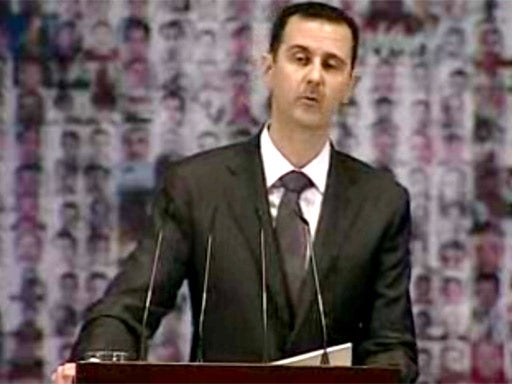Britain and US fear Syrian chemical weapons could fall into the hands of extreme Islamist groups

The prospect of Syria’s chemical arsenal falling into the hands of extremist Islamists among the rebels fighting the country’s bloody civil war is a matter of mounting concern for the West.
General Sir David Richards, the head of the British military, has raised his worries in Whitehall in recent weeks and there has been a series of meetings over the issue between European and American officials and governments in the region.
The possibility that President Bashar al-Assad may unleash such weapons was one of the key reasons given for the deployment this week of Nato Patriot missiles to the Turkish border.
At the end of last year Barack Obama warned that the use of chemical weapons would mean the Assad regime had crossed a ‘red line’ and must bear the consequences. The regime appeared to have stopped on its tracks in preparing such attacks and defence secretary Leon Panetta stated subsequently that the threat has been reduced.
Although the US and UK governments still hold that a beleaguered regime on its last legs may use weapons of mass destruction (WMD) there is also the clear danger of jihadist fighter getting possession of stockpiles. The Obama administration has proscribed the Al-Nusra Brigade, one of the strongest of the rebel groups and one which declares itself affiliated to al-Qa’ida, as a terrorist organisation.
An SAS team is believed to have attended as observers an exercise carried out by US and Jordanian special forces in preparation for any operation which may have to be undertaken to secure the stockpiles. Defence sources in London stated there are no plans at present to deploy British personnel for such a mission.
There is bound to be public scepticism about claims of the Syrian regime and WMDs after the exposure of similar false reports about Saddam Hussein’s arsenal used by the Bush and Blair administrations to justify the invasion of Iraq.
Western officials insist, however, that there is ample evidence that the Damascus regime has the means to carry out chemical warfare and also evidence, of a more limited nature , that it has a biological warfare programme. One cause of apprehension is that the regime’s command and control for WMDs have been severely damaged by casualties and defections.
A series of meetings have taken place involving military personnel from the US, France, countries in the region and Israel whose prime minister, Benjamin Netanyahu, according to media reports in Jerusalem, met King Abdullah II of Jordan in Amman to discuss the matter. One aspect of Israeli concern is that Hezbollah, some of whose fighters have been fighting for the Assad regime, may be able to smuggle chemical weapons into Lebanon.
The vulnerability of the chemical stock is believed to have been discussed between American and Russian officials on a number of occasions . The Russian foreign minister, Sergey Lavrov, subsequently stated that the chemical stock was being kept in two centres and it would be “suicidal” for the Assad regime, — which his government has supported throughout the uprising – to use them.
General Adnan Sillu, the recently defected former head of the Syria’s chemical weapons programme, has claimed that the regime has already used Sarin gas in an attack last month on the Al-Bayyadh district of Homs. The opposition Free Syrian Army maintains that the regime has used chemical weapons on 18 separate occasions. Western officials maintain, however, that photographs and testimonies they have received does not back up the charge.
An independent chemical and biological analyst, Dr Sally Leivesley, said: “If there really was an attack involving Sarin, then one would expect a significant number of fatalities. From what one hears about the symptoms it’s possible that a harassing agent rather than a nerve agent was used.”
Syria’s biological programme is less detailed than its’ chemical one. Dr Leivesley, who trained as a scientific advisor with the Home Office, and now works as a consultant to private industry as well as governments, said : “ Reports of Syria’s bio-warfare programme goes back to the mid-90s and there was report to the US Congress on 2004 and Nato reports. The material on all this is interesting because it was put together a long time before current events and thus one can’t say that it has been put together to fit a particular agenda.”
The problems with biological agents, Dr Leivesley held, may start by accident rather than the design of either the regime or rebels. “Pathogens such as anthrax, plague, tularemia, botulinium, smallpox, aflotoxin, cholera, and ricin can become exposed by people stumbling across them in insecure bases. If this happens we have the real possibilities of pandemics which will be very difficult to control” she said. “Of course one must guard against being alarmist, but what is necessary is to get as much information as possible so that we can at least know what we are facing.”
Join our commenting forum
Join thought-provoking conversations, follow other Independent readers and see their replies
Comments
Bookmark popover
Removed from bookmarks